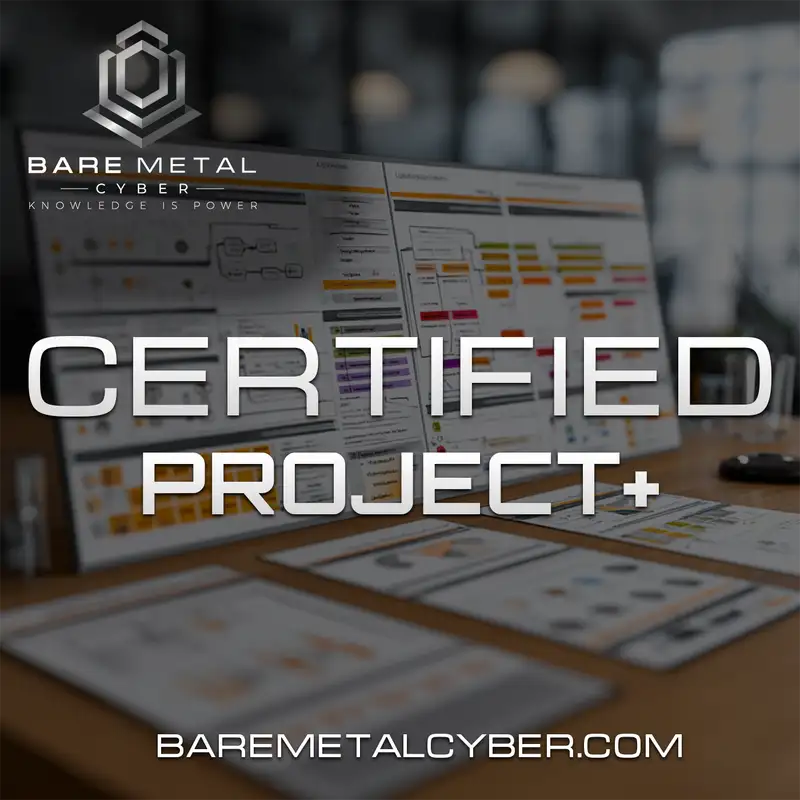All Episodes
Displaying 21 - 40 of 88 in total
Episode 21: Communicating, Implementing, and Validating Change
This episode covers the final stages of the change control process, focusing on effective communication, implementation, and validation. You’ll learn why promptly info...

Episode 22: Scope Change vs. Scope Creep: How to Manage Both
In this episode, we distinguish between legitimate scope change and uncontrolled scope creep. We define scope change as a formally approved adjustment to project deliv...

Episode 23: What Is Project Risk? Identifying and Categorizing Threats
This episode introduces the fundamentals of project risk management, starting with the definition of risk as any uncertain event that can positively or negatively affe...

Episode 24: Qualitative and Quantitative Risk Assessment Explained
In this episode, we compare qualitative and quantitative risk assessment techniques, detailing their purposes and applications. Qualitative analysis focuses on factors...

Episode 25: Responding to Risk: Avoid, Mitigate, Exploit, Transfer
This episode examines common strategies for responding to both negative and positive risks. For negative risks, you’ll learn how to avoid, mitigate, transfer, or accep...

Episode 26: How Risks Connect to Issues and Change Requests
This episode explains the relationships between risks, issues, and project changes, a concept that often appears in PK0-005 exam scenarios. We’ll clarify how an identi...

Episode 27: Project Issues: Tracking, Escalation, and Roles
In this episode, we focus on effective issue management, beginning with proper identification and tracking. You’ll learn the importance of using a centralized issue lo...

Episode 28: Creating Resolution Plans and Prioritizing Severity
This episode covers how to develop structured resolution plans for project issues, starting with root cause analysis to identify the underlying problem. You’ll learn h...

Episode 29: Workarounds, Documentation, and Final Outcomes
In this episode, we explore temporary solutions—known as workarounds—that allow projects to continue despite unresolved issues. You’ll learn how workarounds differ fro...

Episode 30: Milestones and Activity Identification in Project Scheduling
This episode introduces the first steps of project scheduling, beginning with identifying milestones and defining activities. We’ll explain how milestones represent ke...

Episode 31: Dependencies: Hard Logic, Soft Logic, Internal, External
This episode explains the different types of task dependencies that influence project scheduling. Hard logic, or mandatory dependencies, represent relationships that c...

Episode 32: Successor and Predecessor Relationships in Detail
In this episode, we focus on the four primary types of task relationships: finish-to-start, start-to-start, finish-to-finish, and start-to-finish. We’ll define each re...

Episode 33: Estimating Resources, Buffers, and Story Points
This episode covers estimation techniques for project resources, contingency buffers, and Agile story points. You’ll learn how to determine resource requirements for e...

Episode 34: Sprint Planning, Critical Path, and Rebaselining Techniques
In this episode, we link Agile sprint planning with traditional scheduling concepts like critical path analysis. You’ll learn how sprint planning defines goals, select...

Episode 35: Quality vs. Performance: Understanding the Distinctions
This episode examines the difference between quality management and performance management in projects. Quality focuses on meeting requirements and delivering outputs ...

Episode 36: SLAs, KPIs, and Variance Analysis for Projects
This episode focuses on the measurement tools and performance indicators that help project managers track progress and maintain accountability. We define Service-Level...

Episode 37: Testing Types: Unit, Regression, UAT, Stress, Smoke
In this episode, we review the various testing methods used to verify deliverables before project completion. Unit testing checks individual components, while regressi...

Episode 38: Verification, Validation, and Post-Implementation Support
This episode clarifies the difference between verification and validation, two concepts frequently tested on the PK0-005 exam. Verification ensures that deliverables m...

Episode 39: Communication Methods: Synchronous, Asynchronous, Formal
In this episode, we examine different communication methods and their application in project environments. Synchronous methods, like meetings and calls, occur in real ...

Episode 40: Overcoming Communication Barriers: Time, Culture, Tech
This episode addresses common challenges to effective communication in projects, including time zone differences, cultural variations, and technological limitations. W...
